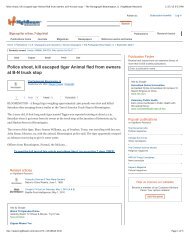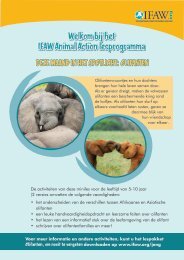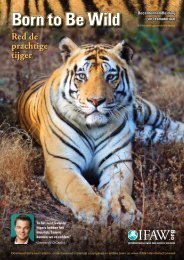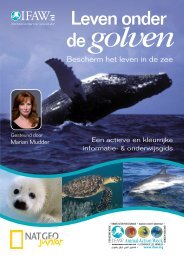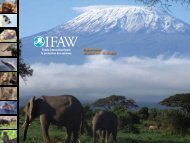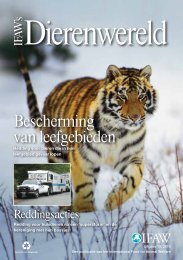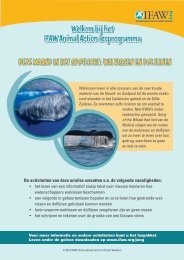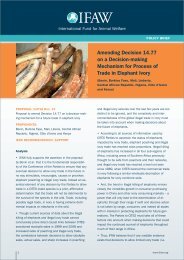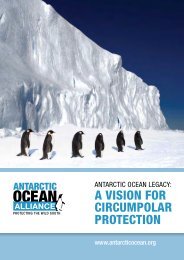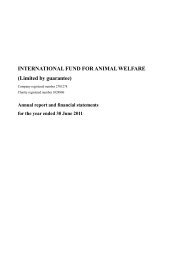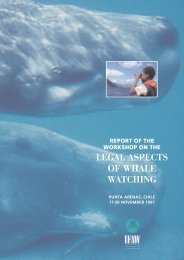Whale Watching Worldwide
Whale Watching Worldwide
Whale Watching Worldwide
Create successful ePaper yourself
Turn your PDF publications into a flip-book with our unique Google optimized e-Paper software.
epresents a significant average annual growth rate of just under 10% per annum since 1998. Across the<br />
entire region, the industry is responsible for over $300 million in expenditures, up from $123 million in 1998.<br />
For this section of the report, we have used additional data from reports undertaken over the last five years<br />
by Economists at Large for the Oceania region – New Zealand, Australia, Tonga and the Pacific Islands have<br />
all been researched as part of separate reports for IFAW. 27<br />
For the Pacific Islands, a recent report was released in 2008 that looked at the industry in 2005. We have<br />
drawn on this for the figures produced in this report, in many cases replicating those earlier figures (where<br />
whale watching was a low level activity). In some cases, we have projected a growth trend forward from the<br />
2005 figures based on country tourism arrival data combined with most recent growth rates in whale watch<br />
tourism. Where this has occurred, it has been noted in the country summary below. For the major Pacific<br />
Islands, where most of the whale watch activity occurs, discussion with local country contacts assisted to<br />
ascertain the rate of change since the 2005 data was gathered. Where any growth projections are estimated<br />
(from 2005‐2008), we have based these on a conservative figure of 2.4% annual average growth rate of<br />
international inbound tourism. This figure is reported by the UN World Tourism Organisation as the average<br />
rate of growth across the Oceania region for 2000‐04 (most recent data available). The same rate of growth<br />
has been applied to expenditure levels.<br />
In the case of Australia and New Zealand, entirely new surveys have been completed for this report in order<br />
to gather the most up‐to‐date data on these countries, due to the significant size of their respective<br />
industries. We have also covered whale watchers to Antarctica for the first time since IFAW’s 1998 global<br />
study, and Guam has been totally re‐researched as it has such a significant proportion of the whale watching<br />
tourism in the Pacific Islands region. For the countries of American Samoa, the Cook Islands, the Federated<br />
States of Micronesia, Fiji, French Polynesia, New Caledonia, Niue, Palau, Papua New Guinea, Samoa and the<br />
Solomon Islands, some research is also derived from an unpublished early version of the Pacific Islands<br />
whale watching report from August 2006.<br />
Acknowledgments:<br />
Thanks go out to many people who have been generous with their time for this and previous work Economists at Large<br />
have undertaken in the Oceania region in the last five years. In particular, Darren Kindleysides and Olive Andrews from<br />
IFAW, Claire Garrigue and Aline Schaffer from Opération Cétacés, Mike Donoghue from the New Zealand Department<br />
of Conservation, and Mark Orams among many others.<br />
27 Economists at Large 2008, Pacific Islands <strong>Whale</strong> Watch Tourism: a region wide review of activity an IFAW report;<br />
Economists at Large 2008, <strong>Whale</strong> <strong>Watching</strong> Tourism in the Kingdom of Tonga, a report for IFAW and Opérations<br />
Cétacés; Economists at Large 2005, The Growth of <strong>Whale</strong> <strong>Watching</strong> in Sydney 2003‐2004: Economic Perspectives, an<br />
IFAW Report; Economists at Large, 2005, The Growth of the New Zealand <strong>Whale</strong> <strong>Watching</strong> Industry, an IFAW Report;<br />
Economists at Large 2004, From <strong>Whale</strong>rs to <strong>Whale</strong> Watchers: the growth of whale watching tourism in Australia, an<br />
IFAW report.<br />
156





